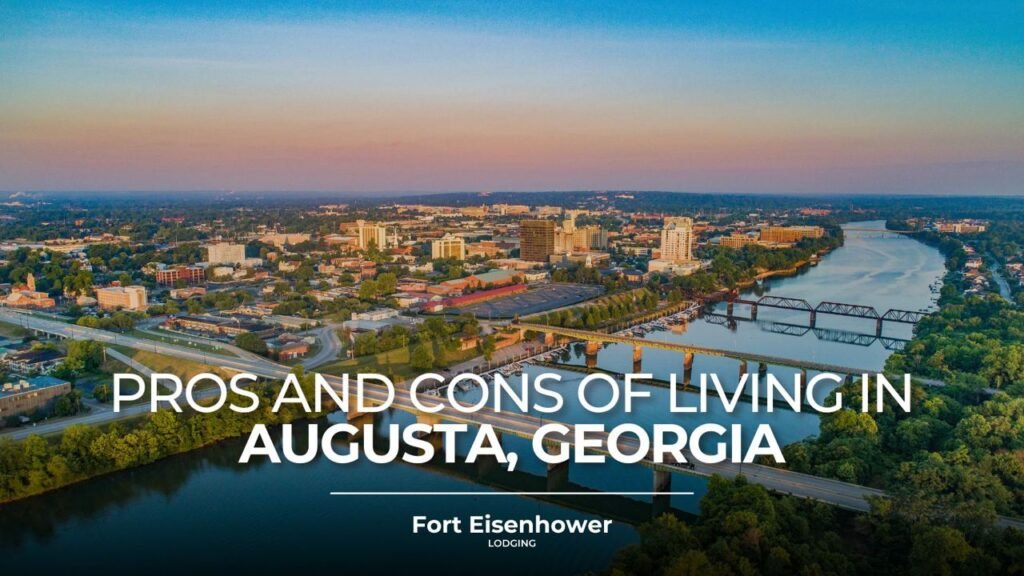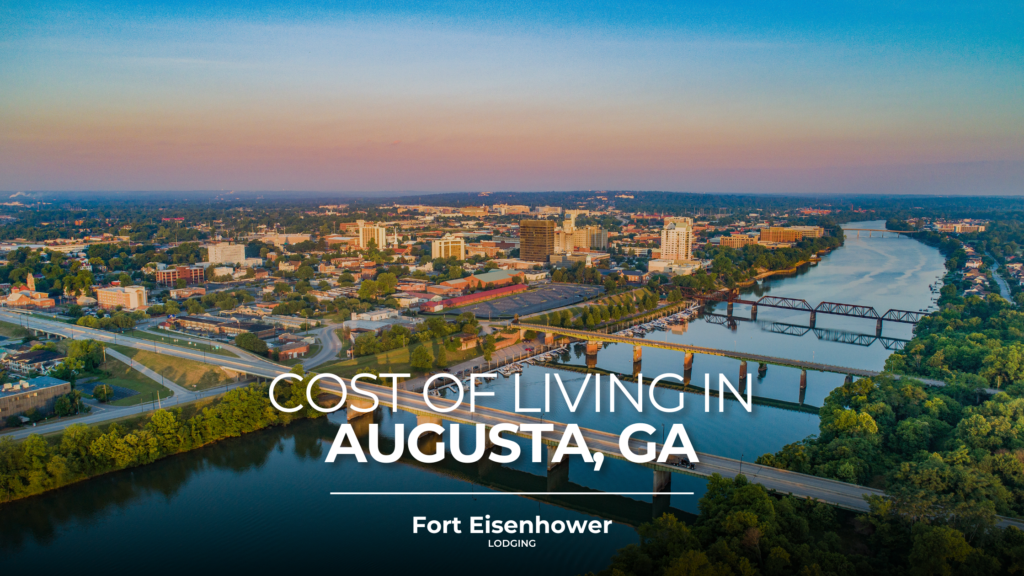
Augusta, Georgia, often referred to as the Garden City, is a charming southern gem nestled along the banks of the Savannah River. Known worldwide for hosting the prestigious Masters Tournament, Augusta offers residents a unique blend of history, culture, and natural beauty. However, like any city, Augusta has its share of advantages and drawbacks for those considering calling it home. In this blog post, we’ll take a closer look at the pros and cons of living in Augusta, GA.
Table of Contents
Pros of Living in Augusta, GA
Affordable Cost of Living
According to PayScale, living in Augusta, GA offers a cost of living that is 13% lower than the national average.This affordability extends across various aspects of daily life, including housing, utilities, groceries, and transportation. Specifically:
- Housing Expenses: Housing costs in Augusta are notably lower, approximately 32% below the national average.
- Grocery Prices: Grocery prices in Augusta is 5% lower compared to the national average, providing savings on essential goods.
- Healthcare Costs: Medical expenses, including doctor visits,is 7% lower in Augusta, contributing to overall affordability.
These factors contribute to Augusta, GA, being a cost-effective and practical place to live. With affordable housing options and a lower overall cost of living, residents can enjoy a high quality of life without the financial strain found in many other parts of the country.
Rich History and Culture
Augusta, Georgia, holds a storied history that dates back to its founding in 1736, enriching its cultural landscape with significant milestones and landmarks:
- Historic Homes: The city features well-preserved Antebellum homes such as the Ezekiel Harris House and the Boyhood Home of President Woodrow Wilson, offering insights into the architectural and social history of the region.
- Augusta Museum of History: Established in 1937, Augusta Museum of History showcases artifacts and exhibits that trace Augusta’s development from its early colonial days through the Civil War and beyond.
- Cultural Activities: Augusta hosts a vibrant arts scene with ballet performances, opera, drama, and numerous art galleries and museums, contributing to its designation by the Georgia Arts Council.
The city’s commitment to preserving its historical heritage not only offers residents a glimpse into the past but also enriches the community with educational and cultural opportunities. Whether exploring historic homes or attending cultural events, Augusta provides a rich tapestry of experiences that celebrate its diverse history and cultural contributions.
Outdoor Recreation
Augusta, Georgia, offers abundant opportunities for outdoor enthusiasts due to its favorable climate and scenic landscapes:
- Augusta Canal Trail: Spanning 7.5 miles, Augusta Canal Trail offers picturesque views and opportunities for hiking, biking, and wildlife spotting along its path.
- Savannah River: This iconic Savannah River provides ample opportunities for kayaking and boating enthusiasts. With access points throughout the region, residents can enjoy scenic paddling routes and water sports.
- Golfing: Augusta is renowned for its golf courses, notably the Augusta National Golf Club, home of the prestigious Masters Tournament. Golf enthusiasts can enjoy playing at various courses around the city throughout the year.
The mild climate of Augusta ensures that these outdoor activities are accessible year-round, making it an ideal location for those who enjoy spending time outdoors. Whether exploring the canal trails, paddling along the Savannah River, or teeing off on world-class golf courses, residents of Augusta can immerse themselves in nature without leaving the city.
Thriving Arts Scene
Augusta, Georgia, boasts a vibrant arts scene that enriches the cultural fabric of the city, offering a variety of artistic experiences for residents and visitors alike:
- Galleries: Augusta is home to numerous art galleries showcasing a diverse range of works from local and regional artists. These galleries serve as hubs for exhibitions, art sales, and community events, contributing to the city’s artistic vibrancy.
- Theaters: The city hosts several theaters that cater to different genres, from contemporary plays to classical performances. The historic Imperial Theatre, dating back to 1918, is a prominent venue for concerts, plays, and ballet performances.
- Live Music Venues: Augusta’s live music scene thrives with venues offering performances across genres like jazz, blues, rock, and more. The Miller Theater, reopened in 2018 after extensive restoration, is a notable venue attracting national and international acts.
The arts scene in Augusta not only provides entertainment but also contributes to the city’s economy and cultural identity. It fosters community engagement and supports local artists, making Augusta a dynamic destination for arts enthusiasts and creatives.
Strong Sense of Community
Augusta, Georgia, prides itself on cultivating a strong sense of community through various local initiatives and events that bring residents together:
- Local Festivals: Augusta hosts a variety of festivals throughout the year, such as the Arts in the Heart of Augusta Festival and the Augusta Greek Festival, which celebrate cultural diversity and community spirit.
- Farmers’ Markets: The city’s farmers’ markets, including the G.R.O.W. Harrisburg Market, not only provide fresh produce but also serve as community hubs where neighbors interact and support local farmers. These markets promote healthy living and social cohesion.
- Neighborhood Gatherings: Regular gatherings in neighborhoods like Harrisburg foster friendships and solidarity among residents. These events often include potlucks, picnics, and volunteer activities, strengthening the bonds within the community.
Augusta’s commitment to community-building enhances quality of life, promotes civic engagement, and creates a welcoming environment for both longtime residents and newcomers alike.
Cons of Living in Augusta, GA
Limited Job Opportunities
While Augusta offers a strong sense of community and cultural richness, job opportunities within the city may be more limited compared to larger metropolitan areas. For those seeking specialized or higher-paying positions, it’s often necessary to explore employment options beyond Augusta’s borders.
Traffic Congestion
Augusta faces significant traffic congestion, particularly during peak commuting hours. The city’s infrastructure struggles to accommodate the influx of vehicles, impacting several key thoroughfares, including Washington Road and Bobby Jones Expressway.
Education System Challenges
Augusta’s public school system faces challenges such as funding issues and disparities in academic performance. Families with school-aged children may need to carefully research educational options or consider private schooling.
Humid Summers
Augusta’s subtropical climate means hot and humid summers, with temperatures often reaching the 90s°F (30s°C) and high humidity levels. This can be uncomfortable without access to air conditioning.
Limited Public Transportation
The public transportation system is limited primarily to bus services, which may not be as extensive or convenient as in larger cities. This reliance on personal vehicles contributes to traffic congestion and environmental concern.
Deciding to Live in Augusta, GA
Augusta, GA, offers a unique mix of affordability, cultural richness, and outdoor splendor, attracting residents seeking a well-rounded living experience. Yet, amidst its charms lie challenges such as limited job prospects, traffic congestion, and educational disparities that require careful consideration. By weighing these elements against the city’s offerings, you can make an informed decision about whether Augusta is the ideal place to call home for you and your loved ones.



